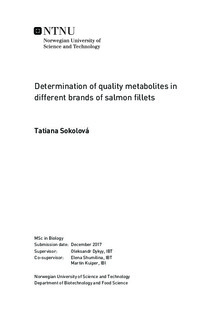Determination of quality metabolites in different brands of salmon fillets
Master thesis
Permanent lenke
http://hdl.handle.net/11250/2486581Utgivelsesdato
2017Metadata
Vis full innførselSamlinger
Sammendrag
Fish offer a multitude of nutritional benefits and its world´s food supply has grown rapidly in the last years. The quality of fish is an important factor for the fish industry and consumers, this field is required to be studied more for further improvement and development of the fish industry. Salmon nowadays is a popular food product and its aquaculture is one of the fastest growing food production systems in the world. In this thesis, fillets of Atlantic salmon (Salmo salar) stored at 4 °C for two weeks were studied. In literature reviews, post-mortem biochemical processes and their changes which can be related to autolysis or bacterial activity were summarized. The normal quality fish processing and high quality fish processing were compared and described. This thesis offers a method that can be used to monitor and determine the quality of salmon. The post-mortem biochemical processes in normal quality and high quality salmon were monitored and compared through the storage. NMR is a reliable and popular tool used for food quality control, and together, 13 water soluble metabolites belonging to amino acids, organic acids, sugars, alcohols, nucleotides, biogenic amines and vitamins were analyzed and quantified using NMR spectroscopy. Some of the most important metabolites were monitored using mass spectrometry. The obtained results showed significant difference between normal and high quality salmon.
Keywords: NMR, fish quality, salmon, post-mortem biochemical processes.
